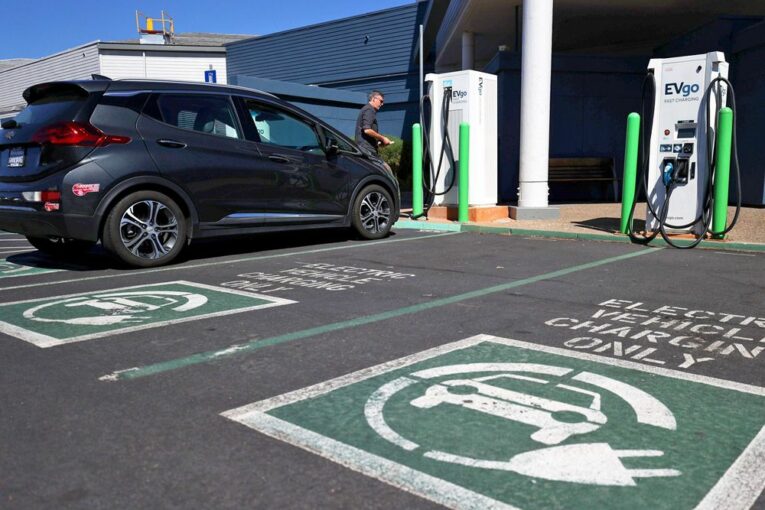
Canadian electric vehicles could qualify for tax credits in the United States, after Senate negotiations over a massive spending bill resulted in the removal of language that would have favoured American automotive production over imports from Canada and Mexico.
At issue was a plan supported by some Democratic lawmakers to attach generous tax credits to the purchase of American-made electric vehicles. Canadian politicians and advocates for the country’s auto industry said the subsidies would violate the North American trade agreement. Following months of furious lobbying, an amendment to the proposal extends tax credits to electric vehicles purchased from all of North America.
“This is an important development. The U.S has put forward a very serious proposal to both extend the EV credit which is critical to boost the consumer adoption of EVs,” said Brian Kingston, CEO of the Canadian Vehicle Manufacturers’ Association (CVMA).
“They broadened out the applicability of it. It’s all based now on North American assembly… this is important because Canada has a completely integrated automotive industry with the U.S.,” he added.
The new proposal also states that EVs eligible for tax credits should include batteries that contain a percentage of critical minerals that were either extracted or processed in countries with which the U.S. has a free-trade agreement or recycled in North America.
This is important because Canada has a completely integrated automotive industry with the U.S.
Brian Kingston
In addition, a percentage of the battery components need to be either assembled or manufactured in North America.
The changes are contained within the Inflation Reduction Act of 2022, sponsored by Democratic senators Chuck Schumer and Joe Manchin, will invest about US$300 billion in deficit reduction to fight inflation and about US$369 billion in energy security and climate change programmes over the next decade.
The investment in clean energy would help lower carbon emissions by about 40 per cent by 2030, the senators said in a joint statement on July 27.
Schumer and Manchin hope to pass the bill through a legislative procedure called reconciliation that will allow them to approve it with only Democratic votes or a simple majority, instead of the normal rule that requires 60 out of the 100 senators to agree. Whether the bill qualifies for reconciliation will be known in the coming weeks.
The bill must also pass the House where Democrats have a majority. “If enacted, this legislation will be historic,” U.S. president Joe Biden said in a statement on July 27.

The changes in the “Clean Vehicle” segment of the bill were lauded by the Canadian governments and its auto and mining sectors.
“Since the prime minister’s first meeting with president Biden last year, we have been relentless in underscoring that the original proposal would be harmful to both Canada and the U.S., so we’re glad to see that recognized in the new version of the bill,” Trade Minister Mary Ng said in a statement.
Flavio Volpe, president of Canada’s Automotive Parts Manufacturers’ Association said that an EV tax credit exclusive to the U.S. was the “largest single threat” Canada’s automakers faced and was glad to see the provision lifted by the same people who tabled it.
Pierre Gratton, CEO of the Mining Association of Canada, which represents 50 of the nation’s leading miners, described the amendment as “good news” for the mining sector, “given its essential role in the EV battery supply chain.”
Kingston said the latest draft eliminates the policy to cap EV sales at about 200,000 vehicles per automaker. A number of companies have already hit the limit. A proposal then came forward to include additional incentives for U.S.-assembled EVs, which raised concerns about the sales of EVs assembled in Canada, as the federal government and Ontario have deployed hundreds of billions of dollars to coax some of the world’s biggest vehicle makes to convert their Canadian plants to build electric vehicles.
With the latest draft, Kingston said that the onus was now on Canada to put forward a “serious proposal” that will encourage more Canadians to take up EVs in order to “keep pace with Americans.”
Canada has accelerated efforts to develop a battery eco-system in recent years, as prices of battery materials have increased due to the rising demand of EVs. In its latest federal budget, the country set aside $3.8 billion for its critical minerals strategy, which will focus on developing EV components.
In July, Belgium-based technology firm Umicore SA signed a memorandum of understanding with the federal government and said that it would spend about $1.5 billion to build a factory in Ontario that would produce cathode active battery materials and their precursor ingredients.
In March, Stellantis N.V. and LG Energy Solution Ltd. announced plans to invest $5 billion to build a battery plant in Windsor, Ont.
• Email: [email protected] | Twitter: naimonthefield
You can read more of the news on source
